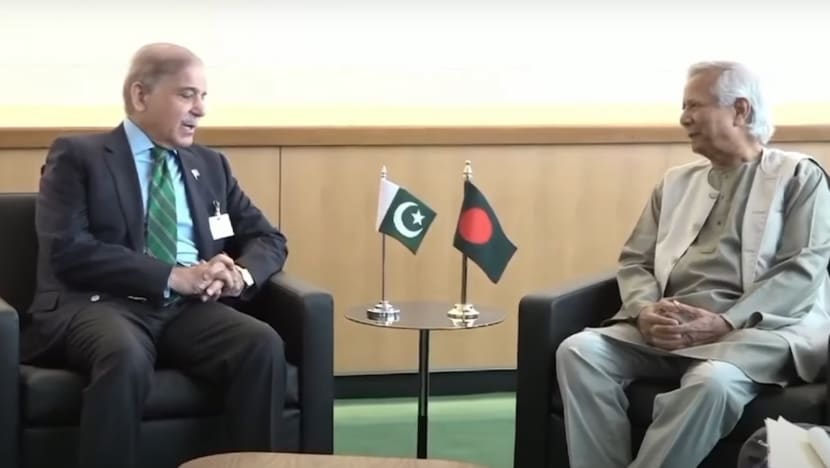Bangladesh marks independence anniversary as long-strained ties with Pakistan improve
Both countries recently renewed diplomatic ties, as well as resumed direct trade for the first time in more than 50 years.

Pakistan's Prime Minister Shehbaz Sharif (L) meets Bangladesh's Chief Adviser Muhammad Yunus for talks on the sidelines of the D8 Summit in Cairo, Egypt on Dec 20, 2024.

This audio is generated by an AI tool.
ISLAMABAD: Last month, Bangladesh and Pakistan resumed direct trade with each other for the first time in decades, with Dhaka importing 50,000 tonnes of rice from Islamabad.
Relations between the two South Asian nations have been fraught with tensions since 1971, when Bangladesh – previously known as East Pakistan – gained independence from Islamabad after a nine-month war.
Recent political upheavals within Bangladesh, most notably the ousting of its former Prime Minister Sheikh Hasina last August, has led to an apparent thaw in the decades-long frost between Dhaka and Islamabad.
Both sides recently renewed diplomatic ties, revived direct flight connectivity and set up high-level military and security cooperation. Pakistan’s Foreign Minister Ishaq Dar also plans to visit Dhaka next month.
Bangladesh on Wednesday (Mar 26) celebrated its first Independence Day since Hasina’s ousting.
Experts told CNA the warming ties are an opportunity for both sides to reshape regional dynamics in South Asia.
"Anti-Hasina elements will remain in power for at least five to seven years or even 10 years,” noted Khurram Abbas, director of the India Study Centre at think tank Institute of Strategic Studies Islamabad.
“So, Pakistan has a five-to-seven-year-long window of opportunity to deepen its security cooperation, economic cooperation as well as political cooperation (with Bangladesh).”
Related:
PIVOT AWAY FROM INDIA AND TO CHINA
Following its liberation 54 years ago, Bangladesh and neighbouring India established a strong and multifaceted relationship, led mostly by Hasina who was in power for 15 years before her ouster.
With Hasina's exit, the new administration in Dhaka pivoted away from India, accusing New Delhi of propping up Hasina's government – a charge India has denied.
Experts said China's growing influence in the region is a key force driving Islamabad and Dhaka closer to each other.
“China (plays) a major role. And being a strategic ally of Beijing, Pakistan has the opportunity to (improve) its relationship with Bangladesh’s … political establishment,” noted Abbas.
China and Bangladesh are marking 50 years of diplomatic relations this year.
Bangladesh’s Chief Advisor Muhammad Yunus is making his first bilateral visit to China after taking charge of his country’s government last August.
His Special Envoy for International Affairs Lutfey Siddiqi told CNA on Wednesday that Yunus will attend a series of meetings, as well as give a keynote address at the Boao Forum for Asia 2025, which began on Tuesday and runs until Friday in the southern island province of Hainan.
“There is a summit planned (with Chinese) President Xi (Jinping), leaders from the business sector, multiple actual and potential investors in Bangladesh,” said Siddiqi on the sidelines of a World Economic Forum symposium held in Hong Kong.
“From an economic diplomacy point of view, it's a very exciting effect.”
ECONOMIC BENEFITS
Pakistan's desire to reset ties with Bangladesh comes as its own economy is struggling, with experts saying both countries are viable markets for each other.
Some in India said there might be a silver lining for New Delhi too in the long run.
“If relations became really good, India could actually gain – there could be transit trade between Pakistan and Bangladesh or even shipping,” said Sanjay Kathuria, visiting senior fellow at New Delhi-based public policy think tank Centre for Social and Economic Progress.
“It creates wealth. It engenders more trade. You can create more value chains between the three countries,” he added.
Observers said the next few years will be critical as Bangladesh and Pakistan seek to solidify their new partnership – with trade, diplomacy, and security cooperation all poised to shape the future of the region.














